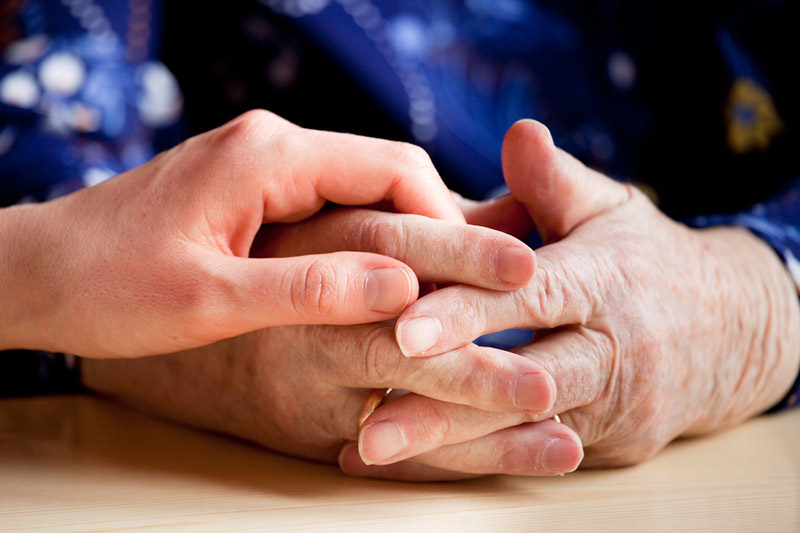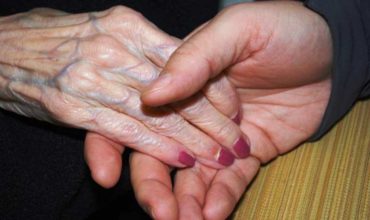 Teepa Snow, a Dementia Expert shares 5 top Dementia tips that will help Dementia caregivers better care for their Dementia patients and help lead a better quality of life.
Teepa Snow, a Dementia Expert shares 5 top Dementia tips that will help Dementia caregivers better care for their Dementia patients and help lead a better quality of life.
It can be difficult, frustrating, and confusing to care for people with dementia.
When frustration mounts, considering these 5 Dementia tips from Teepa Snow will help improve the situation for caregivers and the people that they care for.
1. STEP BACK
When an interaction is not going well, you have a choice, you can push your agenda and watch things get worse, or you can step back and think. What’s happening is often more complicated than it appears on the surface.
In your effort to be helpful, you may have created a problem.
The person who is challenging you is doing the very best they can with what they have left. Stop judging them.
Learn to be a good detective. Your brain works better than theirs, so use it!
Step back and assess their abilities. Know what you are working with.
Try to figure out what might be driving the person;
- What are you seeing?
- What are you hearing?
- What might be their unmet emotional need?
- What is their unmet physical need?
- Why might they be doing what they are doing?
- What are they trying to communicate?
You need to try to see it from their point of view.

2. RESPOND (DON’T REACT)
What you thought would happen didn’t happen. The person did not react the way you wanted (or expected) them to. You’re getting frustrated and you’re getting angry.
What to do? Stop reacting. S
Stop your behavior of trying to correct them. Don’t always try to point out “errors”. Stop trying to fix things. Stop raising your voice and stop pushing your agenda. “Remember, I already told you that” —do you find yourself repeating that sentence? It’s time to stop! Don’t argue with them.
What will be more helpful is to use the words they have given you. It’s called reflective narrative language and will support their ability to make connections.
Repeat back to them what they have said to you— acknowledge and validate what they are feeling. It is not helpful to focus on who is right or wrong. Rather, it is very often helpful to apologize (for whatever happened) and say: “I’m sorry this happened, or I’m sorry I upset you, I was trying to help.”
RECOMMENDED: 2 UNDERRATED WAYS TO MANAGE ALZHEIMER’S RISK
3. MAKE PLANS—BUT EXPECT THEM TO CHANGE
Create a plan, think it through, and get organized. Have a schedule. You know what you want to happen. However, when it doesn’t, you have to be flexible. If your plan isn’t working, you can’t force it! It’s part of your care agenda. Adjust your plans. It was just a plan! Figure out where to go, or what to do, instead. Having alternatives ready is necessary and helpful: Plan B, Plan C or even Plan D.
4. FIGURE OUT WHAT YOU CAN OR CAN’T CONTROL
Stop trying to control what you can’t control. This is so important to realize. You can’t control their dementia or their past (who they’ve been or their routines and preferences that may now be exaggerated or problematic).
And, you can’t control, fix, or change their behavior.
You do have some control, however, over their environment. The physical and sensory experiences including where they are, the objects they use or have access to, and how you guide or help to direct their time.
Consider how you can make a difference for both of you.
Pay attention to what helps them feel valued and important, as well as when they relax and build energy.
Try to prioritize the most important things and what needs to get done. Know your agenda, but don’t show your agenda. And then recognize if or when it doesn’t go as you’d have hoped.

You can figure out how to get yourself under control—and you can build your skills and knowledge about how to better live with dementia. Change what you can change and let go of the rest.
5. TAKE CARE OF YOURSELF
When it’s not working, when something you tried to do didn’t work when you’re getting frustrated or angry.
You need to learn to take a time out. It’s critical to step out of the situation. Take at least 3 deep breaths. Breathe in and out, deeply!
When you are frustrated, angry, or in despair, the person you are caring for picks up on and reacts to your stress level and intensity.
They may not understand what or why you are feeling as you do, but they will be impacted by tone of voice, body language, and the emotional states of others. That’s when you’re no good to them or yourself.
Breathing deeply will help you get back to neutral, lower your emotional level, and help you regain perspective about the situation you are trying to fix.
Also, don’t hesitate to ask for help. Putting support systems in place for surprising times when living with dementia is critical. Dementia is hard work!
Summary: Top Dementia Tips For Better Care Experiences
Managing Dementia is a lot of hard work. Teepa Snow shares her deep insight into 5 top Dementia tips that can help you as a caregiver when managing a Dementia patient.
These tips include stepping back if need be. Learning to respond rather than react.
Making plans but always ready to change.
Figuring out what’s in or out of your control and taking care of yourself.
Hopefully, these tips will help you handle Dementia challenges better and make you a more loving and effective caregiver.
About Teepa Snow
Teepa Snow is a dementia care and education specialist whose teaching style has won her fervent admirers among caregivers in North America.
An occupational therapist by training, she has been called “the horse whisperer of dementia” because of her remarkable skills.
Her mission is to better the lives of people with dementia, as well as the lives of their caregivers by sharing what she has learned.
Snow is based in North Carolina, and has 35+ years of experience working with dementia.
She now offers dementia certifications, including an invaluable life-changing Positive Care Skills Training for those who provide direct care to individuals living with dementia.
1 out of 4 families fall apart when living with dementia. Knowledge and skill make the difference.
Teepa Snow’s Positive Care Skills course helps family members and direct care providers further understand why difficult behaviors happen and what to do about them.
The techniques leverage preserved brain function and teach caregivers how to intervene with more helpful “care partnering” practices that reduce stress for everyone involved.
Individuals who may benefit from this training include certified nursing assistants and other paid care providers including those working for Adult Day programs, homecare companies, and assisted living communities, as well as family members who provide direct care.
For more information and resources, please visit http://www.teepasnow.com.






